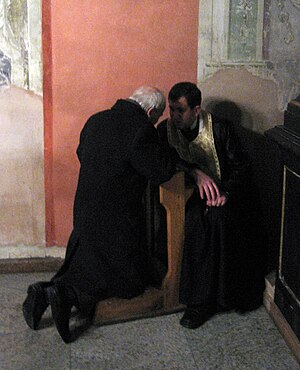About 500 years ago there was this spat. At the time, having your sins forgiven was a sort of pay as you go thing. It was a bit like a toll road.
The toll booth worker was the Priest. If you bought “indulgences” the Priest could better settle up your debt with God.
Handy little business model, especially when folks hope to avoid damnation, right?
This became rather upsetting. So these Reformer types started protesting. It was not so much to split from the Church, but to transform it–at first.
Of course, men can get pretty riled up about their new fantastic ideas (ever seen that?), and before anyone realized it, a huge split…others might say a heresy or rebellion… was cemented into place in history–forever changing the landscape of Christianity.
Spiritually speaking, some good was gained (and Catholics adjusted to these grievances by the 1960s with Vatican II), but as more and more people are beginning to realizing now, some very good and important things were lost because of going this route.
So, what is the real purpose of a priest, or priest-like figure? Is it necessary? Can absolution of sin come from a man in a white collar? What about a teenager in a crew neck? Or a lady with a scarf?
Drum roll, please…..
Oh! Wait! Before, you start gathering firewood and a sturdy stake for my conflagration, please hear me out the entire way. (Then have at it; I’d like to hear from you.)
The I Timothy 2:5 “one mediator” verse is often used to underscore that Christ alone can forgive sins and be our mediator to God. It’s true. This was the mission of the Christ, Jesus of Nazareth.
But Protestants have, by the over-reactive trailblazing of the Reformers, missed quite a bit of the spiritual benefits of what Jesus’ brother James talks about:
James 5:16
Therefore confess your sins to each other and pray for each other so that you may be healed. The prayer of a righteous man is powerful and effective.
What is James saying…that confession and other believers’ prayers are powerful and effective against sin? Yes.
GASP.
Okay, not a total gasp. But how does this play out? You may wonder…
This confessing to each other is not the same as be able to actually take Jesus’ place (obviously). James shows us that confession to each other works. It does something important. God wants it to be done this way.
It absolves us (because God absolves us). So, it is true that we personally experience the relief of our guilt being removed. We experience, in real terms, the agency of God’s forgiveness of our guilt. Someone is there beside us, standing in the gap for us, so we can be reconciled more thoroughly, more completely than we can experience it otherwise. It is God’s work; and we are agents of his ministry.
These confessors to whom we confess become a flesh and blood representation of God’s love that promotes gracious forgiveness and offers wholeness. It offers us freedom from guilt (felt guilt, and feeling or thinking as if Christ‘s work is not complete). It puts flesh on our spiritual justification.
It seems we can’t handle our sin on our own too well, at all.
We are sinful, and it’s not a private matter.
Just confessing to God, and keeping our mistakes and sin to ourselves, is not the recommendation and requirement of Christ’s disciples.
The Community of God (i.e. the Church; our brothers and sisters in the Lord) plays a vital role in our spiritual growth and growth in grace. Confession ushers in that felt healing of the sin and guilt which weigh us down, and disables us.
Our sin is a rejection of community (aka The Bride of Christ) and an act of selfishness.
Our sin is a destructive thing. Socially and spiritually destructive.
Confession and absolution, (the kind you might say/declare out loud to another person) restore us at a core level. To ourselves, to God, and to community (aka The Bride of Christ).
In this way, we act not as God, but on God’s behalf. We minister.
It is simply true that he forgives us. We concur and offer social restoration, and remind the confessing one of God’s gracious work and love for us.
We minister to each other, on equal footing, and we may offer God’s grace to a brother or sister who cannot yet properly apprehend it. We can accept their confession and offer forgiveness, so we speak the Truth of God’s Kingdom into their life. We help set the captives free. (Not because God can’t do it without us, but because he wishes to use us this way.)
YES. We may say, “You have confessed, and you are forgiven. God absolves you. I, too, forgive you. Go in peace, and rest in his love.”
Please offer this to others. Ask for it on your behalf, too.

